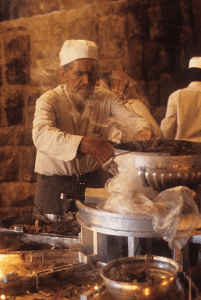
Workshop: Trade Going Up in Smoke? Contact and Exchange in Incense Practices — The Southern Levant as Case Study
Käte-Hamburger-Kolleg “Dynamics in the History of Religions Betwenn Asia and Europe”
14-15 June 2016, Bochum, Germany
Götz König (Berlin): “The Use of Incense in the Zoroastrian Rituals and its Eschatological Meaning”
Rüdiger Schmitt (Münster): “Incense Practice in the Family and Household Religion of the Levant in the Iron Age”
Incense is one of the most prominent practice related to the senses. Flavour, smell, fumigation, or stimulating incense — the spectrum of functions and uses of incense is very broad in a variety of religions. Incense use in ancient rituals is attested by texts, iconography and material culture. This widespread evidence makes “incense” an appropriate case study in religious studies. This use of “incense” was heavily driven by cross-cultural contact: aromas, incense and spices from southern Arabia on the so called “incense trade route” (“Weihrauchstraße”) to the North and West, or the Western trade route which ended up in Gaza. The material culture of incense burners, incense cups, incense altars, shovels, and thymiateria is very rich and shows more than one dimension of mutual influence in terms of types, motives, techniques, and usage contexts. The religious aspect was often neglected in former studies, but the role of incense in trade fosters the question, whether religious influences also shaped rituals, practice, intention, etc.
The speackers:
Götz König is a scholar of Zoroastrianism and a philologist working on ancient and Middle Iranian languages. He is currently a deputy professor at the Institute of Iranian Studies, Free University of Berlin, Germany. He has made important contributions to the study of Old, Middle and New Iranian Zoroastrian literature. His two monographs, “Die Erzählung von Tahmuras und Gamšid” (Wiesbaden 2008) and “Geschlechtsmoral und Gleichgeschlechtlichkeit im Zoroastrismus” (Wiesbaden 2010), have to be highlighted. They convey an impression of his refined philological technique which is at the service of a history of Iranian culture.
Rüdiger Schmitt, from 1979 to his retirement in 2004 Professor of Comparative Indo-European Philology and Indo-Iranian Studies at Saarland University in Saarbrücken; born in Würzburg on June 1, 1939; studies from 1958 to 1965 in Würzburg, Erlangen and Saarbrücken, particularly with Manfred Mayrhofer; after publications on Indo-European poetical language, on the Greek and Armenian languages specialized on the ancient Iranian languages, Old Persian epigraphy and, above all, Iranian personal names.